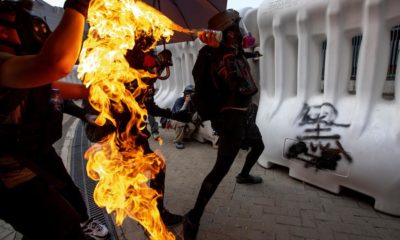World
China’s economy passing through bitter period: Daily

Beijing: China’s economy is passing through “a bitter period of structural adjustments”, said a state-run daily after Chinese stock markets saw their biggest fall since 2007 on Monday.
An editorial “Morale needed as pessimism roils market” in the Global Times on Tuesday said the Shanghai Composite Index dropped 8.49 percent and while the ChiNext Index plunged 8.08 percent.
“Other Asian markets experienced a dramatic fall along with them. US stock markets also plunged to daily limit in early Monday following the big drop in Chinese stocks. Some have therefore dubbed the day ‘Black Monday’,” the daily said.
The editorial said that there seems to be only one reason for the tumble – “investors lack confidence in China’s economic outlook”.
“China’s economy is in a bitter period of structural adjustments. We should become inured to face all sorts of problems with grace. This temporary lack of confidence will not snowball to become destructive,” it said.
“… such a big trend will not be swayed by some unusual short-term jitters in the stock markets or exchange markets,” the editorial said.
“Not long ago, China’s reform of its currency’s exchange rate led to a continuing yuan’s devaluation, which seems to have provided more proof that the nation’s economy is over the hill. The newly released economic figures do not look good. It seems that the words ‘misfortunes never come alone’ have come true,” it added.
Economic observers believe that if investor confidence is low for a long time, it will be normal to see drastic fluctuations as stocks and exchange markets react strongly to specific reasons.
The editorial noted that it is complicated to evaluate China’s economy.
“For example, how to confirm the coordinates and parameters of such an evaluation is not easy. China has bid goodbye to double-digit economic growth, and has entered the ‘new normal’ of growth on a medium-to-high level. But compared with the other major economies in the world, China’s performance is still one of the best. Unfortunately, this reality cannot necessarily convince investors,” it said.
The daily went on to say that most of the investors focus on short-term gains. “…China’ reform is positive in producing favorable results in the long term, while its short-term interests are relatively limited at the moment.”
“However, the vast majority of investors tend to put their immediate interests in first place.”
Global Times asked: “Will China’s economy come to a terminal after this time? Could the economy be sluggish for a long period, or even go downhill?”
“It could be certain that few believe this. If the country’s economy is so lame, and bound to tumble in the future, the whole 21st century will be another story, and a majority of today’s strategic planning could be scrapped.”
The daily said that there is no need to worry because of pessimistic voices from the outside world.
World
Lockdowns in China Force Urban Communities to Defy Censorship and Vent Frustration Online

Shanghai’s rich middle class is leading a wave of online dissent over the strict and prolonged lockdowns imposed in various parts of the country. Chinese internet censorship is struggling as patience is wearing thin in many urban centers, coming up with creative forms of online protests.
Social Media Posts Revealing Lockdown Tension in Shanghai
Drawn-out lockdowns are nothing new in China as authorities insist with the nation’s zero-Covid policy since the start of the pandemic. Currently over This time around, however, metropolitan areas like Shanghai are increasingly difficult to keep quiet, given that its more than 25 million residents have seen weeks of total isolation along with food shortages and many other service interruptions.
Dozens of towns and reportedly over 300 million Chinese citizens have been affected by lockdowns of different severity. As expected, urban netizens have been most outspoken over their difficulties by finding creative ways to get around state censorship and bans placed on topics, news comments and spontaneous campaigns.
Shanghai residents have been using mobile proxies and hijacking seemingly unrelated hashtags to talk about healthcare issues, delivery failures and the overall severity of their situation. The “positive energy” that the Chinese government wants to transmit during the recent prolonged series of lockdowns does not come naturally to those counting food supplies and online censors are working hard to filter words, trending topics and undesired social media sharing.
WeChat groups and message threads are under constant monitoring. Posts questioning the zero-Covid approach have been quickly deleted, including by leading Chinese health experts like Dr. Zhong Nanshan. Video footage is soon censored and protests and investigations are quickly made to disappear.
Where this has not worked, officials have exposed banners with warnings and outright threats like “watch your own mouth or face punishment”, while drones have been patrolling the city skies. Yet, if anything, this has led to further tensions and unspoken confrontation with Shanghai’s educated and affluent middle class.
Creative Online Solutions Harnessing Civic Energy
Announcements by Chinese social media that they would be publishing the IP addresses of users who “spread rumors” have not helped either. Tech industry research has shown that much of Asia’s tech-savvy population has a habit of using mobile proxies and other privacy tools, quickly finding workarounds to browse the internet freely and talk to the world about the hottest topics.
The sheer volume of forbidden posts is already a challenge for the very censorship system, experts explain. Unable to track all trending hashtags, state workers overlook topics that speak about the US, Ukraine or other popular news. Linking human rights elsewhere to their situation, Chinese online dissidents establish their informal channels and “hijack” the conversation to share personal or publicly relevant information about the Covid suppression in their town.
Sarcastic and satirical posts still dominate. Others hope to evade the censors by replacing words from famous poems or the national anthem. One thing is certain – social media, when harnessed with the right creativity, has proven its ability to mount pressure on the government in even some of the most strictly controlled tech environments like China.























